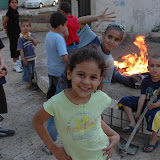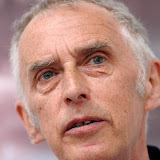
"Bimkom" a non-profit organization of Planners for Planning Rights with the goal of strengthening the connection between human rights and spatial planning in Israel, in cooperation with the Arab Center for Alternative Planning held a
two-day conference on civil society's right vis-a-vis the establishment.The second day of the conference was held in Jaffa at "AlRabita" and dedicated to the fight for affordable housing and against the demolitions and ethnic transfer of the Palestinians from Ajami and Jabaliya neighbourhoods.
As i make it a point never to work on the first of may, happy mayday, by the way, i decided to attend the second day of the conference.
As the demolition problem is urgent, in Jaffa most of us concentrate on the immediate, preveting the close desistaster of ethnic transfer. Yet it truly is important, to pay muoch attention to the larger implications and the long run effects of the activities as well.
What is happening today in Jaffa, is part of a wider tendency, by which extremely wealthy developers and their cronies, all out to make a quick buck, push away very basic human rights, such as affordable housing and sustainable community life. On their way, like a bulldozer, they do away with whathever bothers them even slightly.And they can do so, as they know how to have the law on their side, and if they don't they have enough power to manipulate it to be on their side.
True, Jaffa in general and Ajami and Jabaliyah in specific the problems are more urgent than anywhere else. And it is important to loose every round in the fight to save those neighbourhoods as the Palestinian neighbourhoods they are and have always been.
The fact that the lands and houses were originally Palestinian property taken away from the owners in 1948 by the Israel land administration which then made the owners pay rent for the properties they had been robbed of, makes it al the more horrid.
Yet similar processes take place in Florentin, Kfar Salame and other southern Tel Aviv neighbourhoods: huge office buildings and dwellings for the very rich are being put up at the cost of the inhabitants who are in danger of being kicked out. The developers and investors make tons of money "living of the rent" or making much money by buying and then selling when the price is even better. Thus housing no longer is a need and a right, but a commodity, cynically manipulated for making tons of money by those who already have a lot of it.
The community? The people? Affordable housing? Historic neighbourhoods? Ecology? Who cares. Money, money money...
Architect Busayna Dabit (see image) from Ramle put the discourse in its historical, political, cultural and spatial context, of house demolitions of former Palestinian property in Ramle, Lod and now in Jaffa.
Michael Edwards (UCL, London) provided a description of the very long struggle against developments in the
Kings Cross area in London, a struggle which initially was successful in preventing massive developments which would have left the local population homeless as well as destroyed many historical landmarks, yet the war has not yet been won, as a new, only slightly less horrid development plan has been introduced and it has much support from Blair's cronies and much money stands to be made.
Yet, at the same time, the inhabitants of the area have started
direct talking with the developers, instead of the discourse being mediated by the establishments' various organizational bodies. An interesting approach, possible, because the their are a few large developers. In Jaffa the situation is different in that respect. Yet to be learned, analysed and adapted in other areas in the country.
Emily Silverman of the Technion described various interesting models of "improving without moving": gentrification without kicking out the original population. Mixed income neighbourhoods as an alternative to gentrifying an slummy but attractive area by kicking out the poor to nowhere. Some of these models might be excellent for Jaffa and i believe suggesting an alternative plan incorporating solutions of this kind, might be a good long term housing and community solution for Ajami and Jabaliyah.
Erez Zafdie emphasized the problematic dynamics happening "below the surface": the colonialist tendencies as well as the ethnic nationalist logic's dynamic interaction with the economic "development" principle. The Israel land authority owns most of the land in Israel since 1948. By using a development logic it serves other needs as well. As these incredibly discriminatory methods are difficult to defend in court, the tactic is carried out through privatization of the development. Thus "community settlements" can defend their racist "admitting committees" etc..
There is no doubt the municipality wants to turn Jaffa's Ajami and Jabaliyah into a Jewish neighbourhoods. In fact, the major refused to use the term "mixed city" and describes Jaffa as a Jewish city with a small other ethnic and religious minority, thereby wiping out Jaffa's proud cultural past and much of its current identity as a Palestinian city.
The question of Jaffa becoming a separate municipality was rightfully raised in this respect.
During the afternoon various practical workshops concerning the fight for a Palestinian Ajami and Jabaliya were held, and the results will be obvious in the field.
images:













